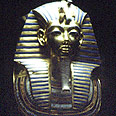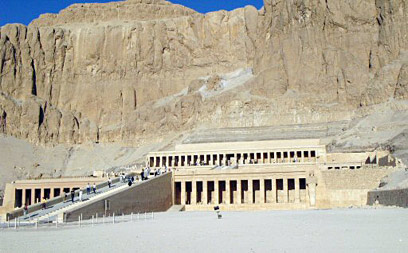
Egypt is undoubtedly one of the oldest civilizations known to man, with an ancient history that can be divided into four segments – the Old Kingdom, the Middle Kingdom, the New Kingdom and the Late Kingdom; dating back to the third millennium BC, when Menes, ruler of Upper Egypt, conquered the Nile Delta and made himself Pharaoh over Egypt, thus forming the beginning of Egypt's 31 ruling pharaoh dynasties.
The Old Kingdom
The Old Kingdom's first and second dynasties introduced the use of stones in construction, while the third and fourth dynasties outlined Egyptian culture, religion and statehood for the generations to come, and gave the world the first pyramids - the Step Pyramid of Pharaoh Djoser (of the third dynasty); the Red Pyramid of Pharaoh Sneferu (of the fourth Dynasty) and Pharaoh Khufu's (fourth dynasty) Great Pyramid of Giza. Egyptian hieroglyphics were evolving, as was the use of papyrus and the thousands of Egyptian gods and goddesses were introduced into their very own pantheon.
The Middle Kingdom
The Middle Kingdom – dynasties 11-13 – saw the end of political and social chaos and overwhelming advanced in construction and architecture, as well as expanding borders, as Egypt conquered Nubia.
The 14th, 15th, and 16th dynasties knew political turmoil, as Egypt was invaded by Hyksos – nomad tribes from Asia, which ruled Lower Egypt. The Kingdome was reunited under the 17th dynasty.

Valley of the Kings. The pyramids at Giza (Photo: AP)
The New Kingdom
The New Kingdom – dynasties 18-20 – saw religious upheaval, as Pharaoh Akhenaten declared Egypt will no longer worship any god but Aten – the Sun God.
The revolution was short-lived as after his death Egypt returned to its gods and goddesses of long before. Egypt's borders expanded once more reaching the River Tigris (modern day Turkey and Iraq).
Pharaohs Seti I and Ramesses II soon led the 19th dynasty to further victories, while the time of Pharaoh Ramesses III (the 20th dynasty) was forced to relinquish some of his predecessors' conquests, thus ending the great days of the New Kingdom.
The Late Kingdom
Late Kingdom times – dynasties 21-26 – were characterized by unrest, as the constant change in leadership rendered Egypt vulnerable to outside attacks, to the extent of it being conquered by the Assyrian Empire.
The Assyrians' downfall failed to help Egypt, as it soon found itself under the Persian Empire's rule. In 525 BC a new, Persian dynasty was formed – the 27th, but it failed to stabilize the war torn country. The dynasties which followed – 28-31 – did not fare better.

A tale as old as time. The Temple of Hatshepsut at Luxor (Photo: AFP)
The Greco-Roman years
In 332 BC Alexander the Grate conquered Egypt, uniting it with Hellenist world and allowing it to become one of its driving forces. In 305 BC, after his death, Ptolemy, one of the senior officers, took over the region, forming a dynasty that would rule over Egypt, Israel, Cyprus, Asia Minor and the Aegean Sea isles for nearly 300 years.
Rome soon came into play, eventually forcing the House of Ptolmey out, killing its last descendent, Ptolmey XV in the first century BC and instating Roman rulers instead. In 212 BC Egyptians were granted Roman citizenship under the Empire.
Christianity and Islam in ancient times
Christianity arrived in Egypt in the beginning of the first century AD, as the Coptic Orthodox Church of Alexandria took its place as a leading religious force in the country. During the Roman Empire's redistribution of territories in the third century AD, Egypt was divided into three provinces. The Romans views Christianity as a threat and persecuted those practicing it.
In 312 AD, the Roman Emperor Constantine declared Christianity the Roman Empire's official religion, but allowed the counties under its rule to enjoy freedom of religion.
The Coptic Church entered its golden era, as its Alexandria Patriarchy became the Roman Empire's second largest religious center.
During the fifth century, the Coptic fell from grace, eventually breaking away from the Roman Catholic Church and becoming an independent denomination.














